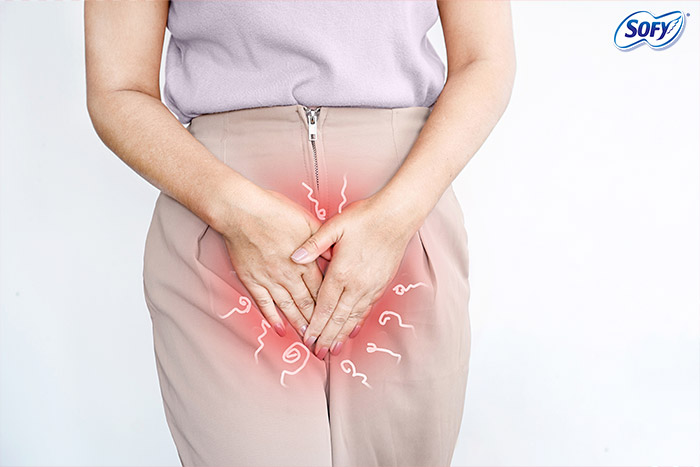Vaginal itching is the WORST. It’s annoying, distracting, and sometimes downright painful. But guess what? You’re not alone, and there are a lot of gentle, natural ways to get that relief you’re craving for.
But before we dive into the do’s, here’s a quick PSA: your vagina is self-cleaning. That means no inserting things inside; no yoghurt, coconut oil, or DIY potions from the kitchen shelf. In fact, doing so can actually mess with the healthy bacteria already working hard to protect you. Instead, let’s talk about external care and habits that actually help.
1. Keep It Dry, and Hygienic
Moisture is not your friend when you’re dealing with discharge or itching. Change your underwear regularly, especially if you feel damp. If there’s more discharge than usual (completely normal on some days!), a SOFY Pantyliner can save the day. It keeps you feeling fresh, dry, and super comfy, without irritating your skin.
For keeping it dry and hygienic even on period days, try out SOFY Antibacteria pads, which provide 6-layers deep absorption, and help keep your skin dry and hygienic with an antibacterial sheet on top.
Also: clean the outer area (your vulva) gently with plain water. That’s it. No soaps, no scented washes, no douching. Over-cleaning or using harsh products can actually cause more irritation or infections. Less is truly more here.
2. Cotton Underwear FTW
Say no to tight synthetic fabrics and yes to 100% breathable cotton. Your vulva needs air, not sweat-trapping lace. Soft, comfy cotton undies help reduce friction and let your skin breathe, which means fewer chances of itching or irritation. Bonus: they’re cute and practical.
3. Probiotics = Vaginal Wellness BFF
Healthy bacteria are your vagina’s personal bodyguards. Probiotics (whether as supplements or in foods like yogurt, miso, or kimchi) can help maintain the balance of good bacteria in your gut and your vagina. Just munch, don’t insert.
Need a quick tip? Add probiotic-rich snacks to your daily routine. Your body will thank you.
4. Avoid Rubbing or Wiping Excessively
We get it: white discharge can feel uncomfortable. But wiping too often (especially with tissues or rough toilet paper) can actually create friction and cause rash-like irritation on the labia. Instead, wear a pantyliner to absorb the discharge and change it a few times a day. If you must wipe, do it gently with soft, unscented tissue or a damp washcloth.
5. Know When to See a Doctor
If the itching continues, is painful, or comes with weird smells or discharge, it’s time to check in with your gyno. Don’t try to self-diagnose or use over-the-counter creams because different infections need different treatments, and only a doctor can help figure that out.
Final Thoughts
Your vaginal health is just as important as anything else — and talking about it shouldn’t feel weird. Itching happens. Discharge happens. And caring for your vulva should be gentle, simple, and fuss-free.
SOFY’s got your back on all kinds of days — with pantyliners for discharge, the AntiBacteria range for hygienic period protection, Bodyfit pads for heavy flow days, and tampons that give you a no-feel vibe even during periods.
So the next time your vagina’s a little cranky, treat her with kindness, comfort, and a whole lot of chill. You’ve got this.
FAQ’s
2. Is vaginal itching always a sign of an infection?
Not necessarily. While infections like yeast or bacterial vaginosis can cause itching, it can also happen due to non-infectious reasons like dryness, friction, or allergic reactions. A medical check is recommended if the itching persists.
3. Can menstrual hygiene products cause vaginal itching?
Yes, using scented pads, tampons, or pantyliners, or wearing them for too long can cause irritation or allergic reactions. Switching to unscented, breathable products and changing them regularly can help prevent discomfort.
4. How can I prevent vaginal itching during periods?
Use breathable sanitary products, change pads frequently, avoid scented intimate washes, and wear cotton underwear. Keeping the area dry and clean during periods is crucial to preventing irritation.
5. Is it safe to use intimate hygiene washes daily?
Mild, pH-balanced hygiene washes can be used, but overuse or using harsh products may disrupt the natural balance and cause itching. Water and gentle cleansing are often enough unless recommended otherwise by a doctor.
6. How does clothing affect vaginal itching?
Tight jeans, synthetic underwear, or clothes that don’t allow the skin to breathe can trap moisture and increase friction, leading to itching. Wearing loose, cotton underwear helps keep the area dry and comfortable.
7. What should I avoid to reduce vaginal irritation?
Avoid using scented soaps, bubble baths, colored toilet paper, and harsh detergents on underwear. These can irritate sensitive skin around the vaginal area and lead to itching or rashes.
8. When should I see a doctor for vaginal itching?
If the itching persists for more than a few days, comes with unusual discharge, burning, or a foul smell, it's best to consult a doctor. These could be signs of a treatable infection that needs medical attention.
9. Can stress cause vaginal itching?
Yes, high stress levels can affect your body’s immune response and may indirectly lead to infections or dryness that cause itching. Managing stress through rest, exercise, or relaxation techniques can be helpful.
10. Are there home remedies to relieve vaginal itching?
Yes, wearing breathable cotton underwear, applying cold compresses, avoiding irritants, and using mild, fragrance-free products can offer relief. However, avoid self-medication and see a healthcare provider if symptoms worsen.

